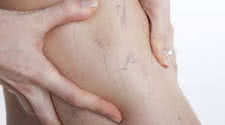Weight Training and Varicose Veins

Health Research with The Physician and Sports Medicine
Varicose veins can ruin an otherwise great pair of legs. They usually aren't a health problem, however, but for some people they're bad enough to affect lifestyle says The Physician and Sports medicine. Exercise, depending on the type, can either aid or exacerbate the circulatory
problems that cause varicose veins. Walking helps somewhat in reducing hydrostatic pressure in patients with superficial varicose veins. However, activities that involve holding your breath or tightening your abdominal muscles can elevate the blood pressure characteristics that
lead to varicose veins. Jogging on hard surfaces and other repetitive exercises can also have an effect on the blood pressure, which in turn can affect varicose veins.
If you have varicose veins, you need to modify your exercise pattern to avoid further deterioration. Don't stand for long periods, particularly if you're straining or involved in heavy abdominal contractions. Avoid repeated pounding, as in jogging or jumping rope. You can swim:
swimming is one of the activities least likely to cause a problem. Support hose, including support pantyhose, can ease some of the pressure that contributes to varicose veins.
Therapies are available should varicose veins become uncontrollably severe and unresponsive to conservative therapy. Sclerotherapy, an office procedure that involves a saline injection can reduce varicose veins.